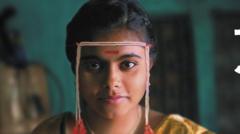The notion of marriage being a sacred union may be widespread, but in India, where arranged marriages are predominant, the journey toward this union can often be torturous, especially for women. This unsettling dynamic is explored in depth in "Sthal: A Match," a compelling Marathi-language film released in India on Friday, which has received critical acclaim at international film festivals.
Set against the backdrop of rural Maharashtra, the film follows Savita, a determined young woman aspiring for an education and professional life amidst a patriarchal society. Her father, Daulatrao Wandhare, a struggling cotton farmer, is depicted in pursuit of securing a suitable husband for Savita, reflecting the dual pressures of agricultural success and marriageability. "He wants a good price for his crop and a good match for his daughter," explains director Jayant Digambar Somalkar.
Sthal distinguishes itself from mainstream Indian cinema by candidly portraying the painful reality many women face during arranged marriages, described by its lead actress as "very humiliating." The film's cast comprises non-professional actors selected from the community in which it was filmed, adding a layer of authenticity to the narrative. Leading actress Nandini Chikte has already garnered accolades for her portrayal of Savita.
The film opens with an uncomfortable scene where Savita interviews a potential groom. As friends and family look on, the nervous young man stumbles through the questioning, mirroring the anxieties shared by many during these arranged meetings. The harsh reality of gender roles is starkly illustrated when Savita, dressed in traditional attire, is subjected to an interview-like scrutiny from a panel of prospective male suitors. Questions bombard her regarding her name, education, and even appearance, underlining the inherent objectification.
Traditionally, women in India face immense pressure to conform to societal expectations surrounding marriage. Savita's aspirations for further studies and a successful career are dismissed in a culture that prioritizes marriage above personal ambitions. Her plight resonates with many, including Chikte, who expressed the indignity of being assessed by a group of men, who reduced Savita's worth to superficial qualities like skin color.
Moreover, the film addresses the pervasive issue of dowry, a practice that, despite being illegal for over six decades, remains a grim reality for many families. As seen in the film, Daulatrao contemplates selling land to meet dowry demands, illustrating the lengths to which families will go, often risking financial ruin. This societal pressure persists at a staggering cost, as insufficient dowries have resulted in severe consequences for many brides.
Director Somalkar's insights into arranged marriages are deeply personal, stemming from his experiences watching the ritual unfold during his youth. His pivotal moment came in 2016 when he found himself as a guest at a marriage meet, feeling disturbed by the discussions around women as if they were mere products. This revelation prompted him to reflect on the broader implications of such traditions and their detrimental effects on women's lives.
While "Sthal" contributes to the ongoing discourse surrounding arranged marriages in India, it differentiates itself from other cinematic portrayals that often glamorize the wedding experience. Somalkar asserts that while popular media may celebrate weddings, the harsh realities faced by the average Indian family must not be overlooked.
Ultimately, "Sthal" aims to challenge societal complacency, provoke dialogue about women's roles, and highlight the often brutal process of marriage in a culture where personal choice remains largely unattainable. As Somalkar remarks, "I know one book or one film doesn't change society overnight, but it can be a start."





















